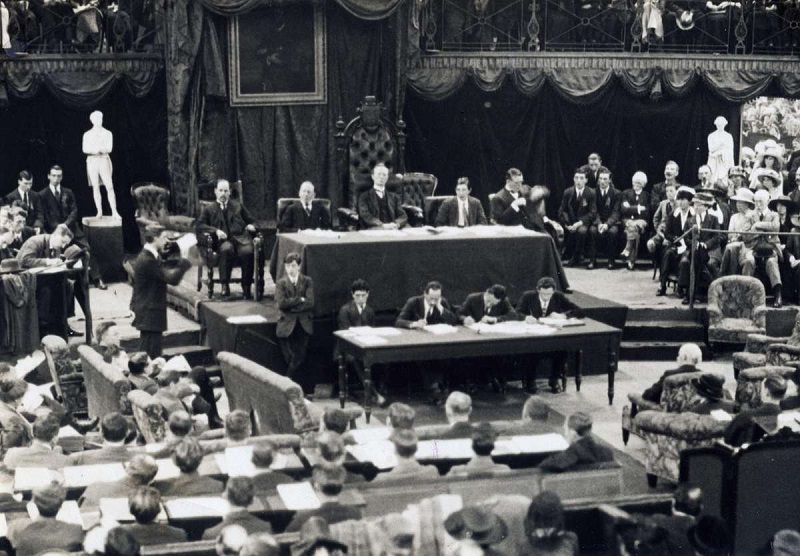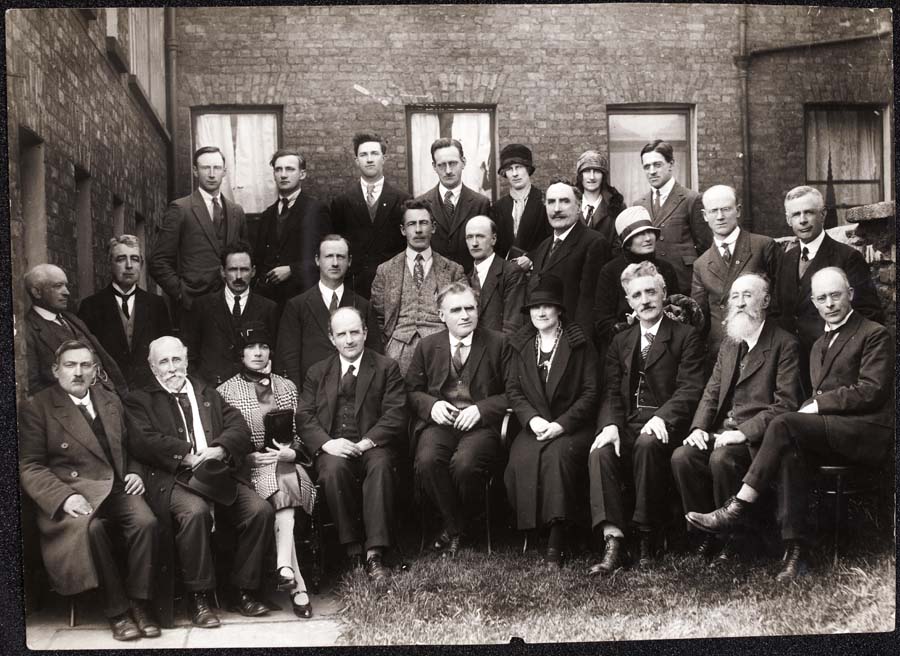It is scarcely necessary to point out at this meeting how the world was deceived in the Great War, how those who went into the fight were deceived by those who sent them to fight. These men who went to give up their lives were told that they were not to go to fight for Empires but for the freedom of peoples. They were told to go to France and to Flanders that they might fight for the rights of nations, great and small, to order their lives according to their own will. Millions of homes have been ruined and millions of money have been lost in order, as those who made the sacrifices thought, to establish a reign of government by the consent of the governed.
You know what happened in Paris when the last Dáil came into session. The Peace Conference was still on, and you had hopes from those who expressed sentiments such as were expressed by President Wilson—and it was not by President Wilson alone, but by English Ministers, who seemed to have most to say at that Conference—that the principles which they had proclaimed and the principles in virtue of which they had called for sacrifices from the peoples should not be lost, and it was in preparation for that right of self-determination which you had exercised that you proclaimed here that Ireland wished to live its own life as an independent country.
When the Ministry proclaimed its policy here, after the release of a number of us who were in prison, they proclaimed it in words which were an adaptation of Cardinal Mercier's words in reference to Belgium. It is no harm to read these words again, because it is these words which govern our policy as a Ministry still. We were speaking in reference to one authority that came to rule in Ireland, and Cardinal Mercier was speaking of another authority that came to rule in Belgium:
The authority of that power is unlawful authority. Therefore, in soul and conscience, the Irish people owe that authority neither respect nor attachment, nor obedience. The sole authority in this country is the authority of our own Government, the authority of the elected representatives of the Irish nation. This authority alone has the right to our affection and to our submission. The acts of the usurper have in themselves no authority and such of those Acts as affect the general interests and to which we may give ratification, will have authority only in virtue of such ratification, which alone gives them juridic value.
That was our policy. It is the policy we have acted on, and, please God, it is the policy that we intend acting up to. That has reference to our action at home.
I stated that our representatives went abroad as apostles of liberty. Their success with the peoples has been what one would expect of the peoples. They wished to hear those sentiments once more expressed, because in their hearts they feared that they were about to be forgotten for ever; they feared that a callous cynicism was about to replace them and that it was only in the stress of war that the peoples, and governments in particular, were likely to pay any attention to them. It is because of Ireland's inherent right that our people were listened to and that the peoples recognised that the only lawful authority here in Ireland is the Government of the Republic of Ireland. In the hearts of the people of these countries, therefore, the Republic is recognised. We recognise it, and it is only on the basis of our self-recognition of that that we deal with any foreign power whatever.
The peoples of the countries feared that what was proclaimed during the war would be forgotten. It was generally thought that it was only President Wilson who spoke of the rights of small nations and of the principles of self-determination. In the whole world, there was not one who spoke so eloquently of the rights of small nations as the present British Prime Minister. He said on one occasion:
"The world is a world for the weak as well as the strong; if not, why did God make little nations?
On another occasion he said:
"The heroic deeds that thrill humanity through generations were the deeds of little nations fighting for their freedom—yes, and the salvation of mankind came through a little nation. God has chosen little nations as the vessels by which He carried His choicest wines to the lips of humanity to rejoice their hearts, to exalt their vision, to stimulate and strengthen their faith, and if we had stood by when the brutal hands of barbarism were laid on two small nations, our shame would have rung down the everlasting ages."
President Wilson, at Washington's tomb, on July 4th, 1918, declared on that solemn spot that:
"The settlement of every question, whether of territory, of sovereignty, of economic arrangement, or of political arrangement, or of political relationship, upon the basis of the free acceptance of that settlement by the people immediately concerned, and not upon the basis of a material interest or advantage of any other nation or people which may desire a different settlement for the sake of its own exterior influence or mastery—these great objects can be put into a single sentence.
What we seek is the reign of law based upon the consent of the governed and sustained by the organised opinion of mankind..."
It was the present British Prime Minister who said to the American troops in France next day:
"President Wilson made it clear yesterday what we are fighting for in Flanders."
Then, there need be no negotiations between Britain and Ireland to-day, because Britain has only to recognise the principle, and with the recognition of the principle, there is no need whatever for negotiations. The British Prime Minister has only to recognise the principle which he had in mind when speaking of Russia. He said:
"You must set up a government which the people want; otherwise, it would be an outrage on all the principles for which we fought in the war."
Speaking of Poland, he said:
"Poland has chosen her own Government by universal suffrage, and it is intolerable that any country from outside should come in and impose upon her a Government which she does not want."
There would be no need to negotiate between Britain and Ireland if the British Prime Minister recognised these principles and acted upon them. We stand for principle and we mean to die for it, if necessary.
I am, more or less, trespassing on what I wanted to speak about to-morrow when I say that it is impossible practically for Ireland to negotiate with the British Government. I pointed out before, when we were asked why we did not negotiate, why that was. I said, there can be no negotiation with a man or with a Government or with a Power when the position is that of one who is an unarmed man practically facing a man, with a pistol pointed at his head. When you have no principle to fall back upon, no principle by which you can regulate and adjust your differences, you have nothing to fall back upon but force; and in the end, if the British Government does not state definitely some principle that it stands by, then when Irishmen come to negotiate with Britain, they find that at every step they are confronted by that principle and that force. And, therefore, negotiations with Britain, for the most part, mean nothing. All they mean is an opportunity of saving faces if you want to save faces.
We do not negotiate to save faces. We negotiate to save bloodshed, if we can, but we can only negotiate on right and on principle. We are asked, when we say we will negotiate on the basis of justice, what is justice? It may be difficult to give an abstract definition of justice that would be applicable to every case, but it does not require much for the average man to see what is just and what is not. It is not just that a small nation beside a big one should be giving guarantees for the safety of the big one, instead of the big one giving guarantees for the safety of the little one. If you admit the principle that because a big nation thinks that a small nation beside it is necessary for its advantage, and for its safety or security, and if that makes it possible to claim that the small nation should be annexed, it is not difficult to see that it would not be long before there would be no small nation in Europe.
If big empires can claim to grab up those small nations beside them for their interest, then undoubtedly the small nations which did so much for the world, and which the British Prime Minister talked so much about, would cease to exist. It is not fair to say, therefore, that there is any justice in that. There is no right in that. If I were to take in detail the British proposals, I would prove also that they were not just, and it is because they were not just that we sent the reply that we sent.

